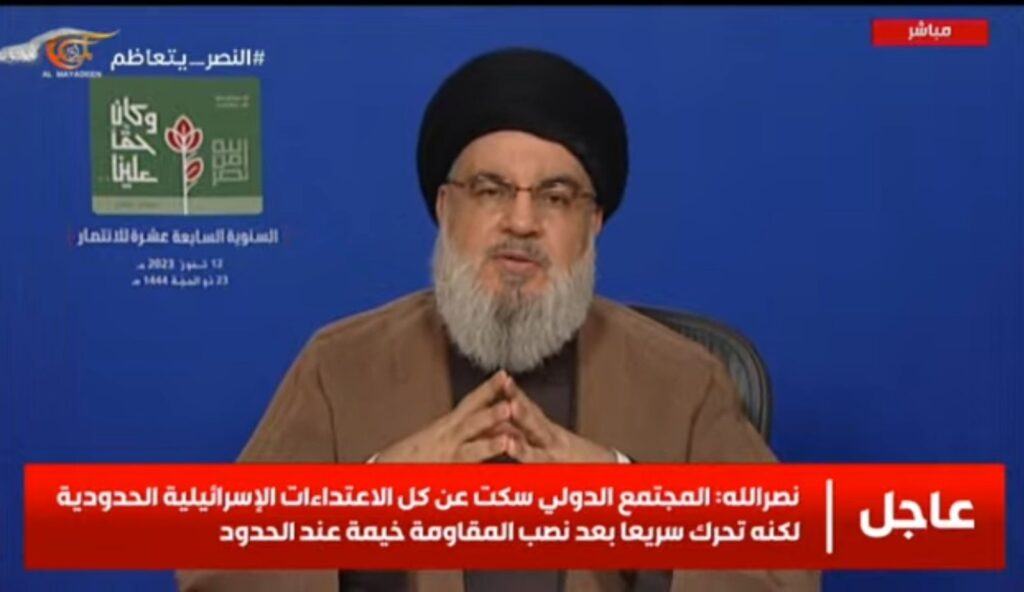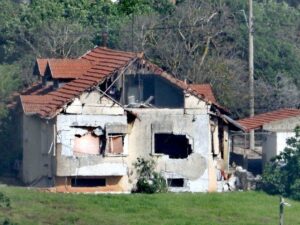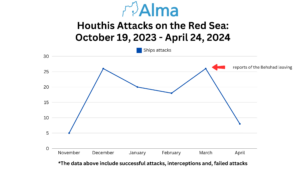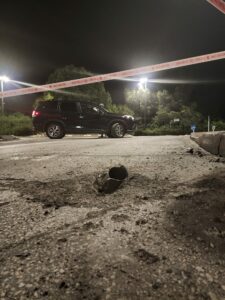“The Lebanese stance on Ghajar must be decisive and this is Lebanese territory and the efforts of the [Lebanese] state and the resistance will be integrated… This land will not be given up to the Israelis. Israel must end its occupation of the border points… Ghajar will not be given to Israel, neither will the Shebaa Farms and the hills of Kafr Shuba… Israel has not dared to carry out a military act against the tent.”
“If Israel was the Israel of the past with the unwinnable military, and Lebanon was the Lebanon of the past that could be conquered with a musical band, they could have easily removed the tents. But because of the power of the resistance today, Israel does not have the courage to carry out such a maneuver. The resistance operatives have orders to act if an Israeli attack occurs on the tent set up on the southern border, and such an incident will not pass with silence…”
– Hezbollah Secretary General Hassan Nasrallah, televised speech, July 12, 2023, marking 17 years since the Second Lebanon War.
A year ago, Hezbollah chief Hassan Nasrallah vowed that in the absence of an agreement on the maritime border dispute between Lebanon and Israel, and if Lebanon will not be able to search for gas, then Israel will also not have natural gas. The meaning of this threat is that Hezbollah would launch a war against Israel.
Hezbollah deployed its operatives to the border to signal its seriousness, and in the end, the State of Israel signed a deal that accepted the Lebanese stance on the maritime border location, almost in its entirety.
Both sides can now extract natural gas from the Mediterranean Sea, but peace in the Middle East hasn’t quite arrived.
Firstly, it is not yet even clear whether the Lebanese side of the maritime border has gas reserves. Secondly, the agreement sent a message to the Hezbollah terrorist organization, according to which, Israel is prepared to carry out far-reaching compromises to avoid war. It was clear that this wouldn’t be the end of the matter.
During the course of the past year, Hezbollah continued to beef up its presence on the border with Israel, sending more military operatives, setting up positions and watch towers that contravene the United Nations Security Council resolutions forbidding such a presence.
According to a resolution (1701) passed after the end of the 2006 Second Lebanon War, the area between the Litani River in Lebanon, 20 kilometers inside Lebanese territory, and the Blue Line is supposed to be totally clear of illegal weapons, meaning Hezbollah’s weapons.
A United Nations Interim Force In Lebanon (UNIFIL) and its 10,000 soldiers are in place to supervise this.
At the same time, Israel experienced two major attacks from Lebanon in the past year; The infiltration by a terrorist on March 13 and the planting of an IED at Megiddo Junction in northern Israel, which miraculously did not claim the lives of tens of Israelis, and the firing of 36 rockets by Hamas on April 6 at the western Galilee (over my house).
Six weeks ago, Hezbollah set up two military tents and placed armed personnel in them in an area considered to be Israeli territory, south of the Blue Line, which is as close to a border as there currently is between Israel and Lebanon.
The UN marked the Blue Line in 2000 and recognized the Israeli withdrawal from Lebanon to that line, but it is not defined as an international border since Lebanon has reservations on its demarcation.
The area in which the tents were set up is especially complex. It is a buffer zone between Syria and Lebanon, which was conquered by Israel in the 1967 Six Day War together with the Golan Heights. France, which ruled the area during the formation of Lebanon and Syria in the early 20th century, did not demarcate the border between precisely.
At the western edge of the area, which is empty of people, is a single village, Ghajar, populated by 3,000 Alawites, all of whom received Israeli citizenship since the Golan Heights were annexed by Israel in 1981.
However, when Israel withdrew from Lebanon in 2000, the UN marked the Blue Line within the village. Israel adopted this marking, but the issue then became humanitarian, since the village could not conceivably be divided in two, and Israeli civilians would not suddenly become residents of Lebanon, separated from the families and losing their rights.
Back to the present: Israel issued a demand to Hezbollah, via UNIFIL, to dismantle the tents. After this call was ignored, Israel turned to the international community through the UN stage. From the moment the issue became public, Hezbollah launched a campaign to ‘liberate’ Ghajar, and the tents issue was included in a wider Hezbollah grievance over the “annexation” of Ghajar by Israel.
Last week, an anti-tank missile was fired at Ghajar, fortunately failing to cause casualties. This is a village popular with tourists, a small paradise within the madness, and a symbol of coexistence and peace, which opened to visitors ten months ago, after Israel completed the construction of a border fence around it, to protect it from smuggling and terrorism.
Lebanon and Hezbollah made it clear that they follow the laws of the jungle. If diplomacy leads to compromise, the next time will lead to more compromises. Israel’s mistake was that, after the compromise on the maritime border, it should not have turned to the diplomatic channel over the land border issue.
The tents should have been removed through a military operation, and the Hezbollah operatives who twice violated UN Security Council decisions should have been stopped, both during their infiltration into Israel, and due to their armed presence in an area that is under UNIFIL’s area of activity.
Here at the Alma Center, we have been stating for a year and a half that Hezbollah is prepared for war. It is prepared to take chances for the Lebanese interest (not the Palestinian interest), which in the past it refrained from taking.
Will Hezbollah want to drag Israel to war? This option is becoming more likely from one day to the next. There is no shortage of excuses. If Israel makes the mistake of abandoning the villagers of Ghajar to Hezbollah, Nasrallah will come with new demands.
The Lebanese government has already turned to the Americans with a request to solve the ground border issue, meaning, to cause Israel to withdraw from all 13 points of dispute with Lebanon over the UN’s Blue Line location. It also stressed that solving these issues will not lead to normalization between the two states.
In order to now play according to the rules of the Middle Eastern jungle, Israel must take a very big chance and risk war with Hezbollah. But if Israel does not play this game, the price will be a hostile unsafe northern border, just like the Gazan border, and perhaps worse.







One Response
Dear Sarit Zehavi,
Your article is very interesting.
I am sure that your information sources and analyzing knowledge and experience exceeding, by far, the ones available to me, but I still see another way to look at the events.
The maritime Israeli Libanees border issue was discussed several years and during 2020, Bibi’s gouvernement, Israel declared it’s intention to solve that issue.
Therefore, when the agreement was signed during 2022, it was after thorough negotiations when every party did it’s own compromises, without any surprises.
Hezbollah tents is a complete other story! Here the IDF failed, seriously, in the Possible Enemy Actions’ analysis, was surprised by the act, probably did not notice it on time, and than, too late for a standard military reaction for enemy crossing the border, it had escalated the issue to the governmental level, of a gouvernement that is busy only with saving Bibi from jail, so Bibi hesitated with the reaction and now Israel has a real, much more serious, problem, as you have already mention, how NOT to bent for Hezbollah’s demands.